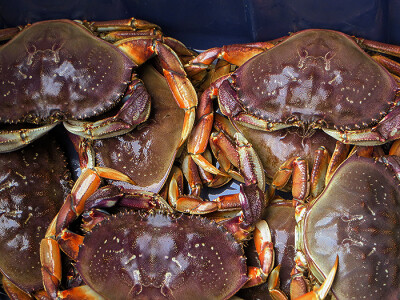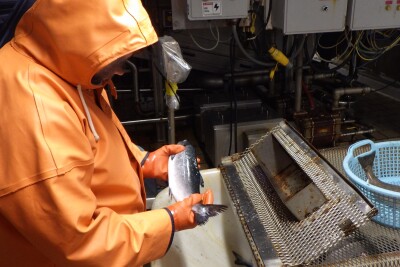Cod. Creative Commons photo by August Linnman.Listening to the radio the other night I caught a teaser for a story coming up about how fish have feelings, too.
I admit, my first thought was “Great, the latest attempt to anthropomorphize something I like to eat.”
I googled the story when I got home. Jonathan Balcombe — described on his publisher’s website as a “myth-busting ethnologist” — is promoting a new book called “What a Fish Knows: The Inner Lives of Our Underwater Cousins.”
According to the book’s online description, it addresses such questions such as: “Do fishes think? Do they really have three-second memories? And can they recognize the humans who peer back at them from above the surface of the water?”
It sounded familiar, and I realized that I recently read an opinion piece Balcombe penned for the New York Times on May 14 titled “Fishes have feelings, too.” Another soft promo for the book, this one focusing on a study that concluded that giant manta rays could recognize their own reflections.
In that item, Balcombe shared a variety of tidbits about fish behavior, some bits and pieces of research, and some observations to arrive at the idea that “the accumulating evidence leads to an inescapable conclusion: Fishes think and feel.”
The Times piece prompted a supportive letter — also published by the paper — by the president of a group called Fish Feel, which bills itself to be “devoted exclusively to promoting the recognition of fish as sentient beings deserving of respect and protection.”
Mary Finelli, the Fish Feel president, concluded her letter with this: “Respect fish: Don’t eat them.”
Now, I don’t think ethologist Balcombe’s goal is necessarily the end of fishing or fish consumption, though he does write in the Times that we humans should “reduce our consumption…and source what we do eat from suppliers that adhere to animal welfare standards.”
No arguments from me about responsible consumption of any resource. If anything, Balcombe’s conclusions justify a stronger focus on wild-capture fisheries over finfish aquaculture. Wild fish already exist in the environment nature created for them, eliminating the need for humans to try and recreate it in a farmed setting in an effort to improve their welfare.
I do have a lot of questions about the value of extensive research into fish feelings. While I am new to this industry, it seems to me that this is not the science fishermen need. They are already up against it in the regulation department, with much of that rule making based on a shallow understanding of how and why species boom and bust. Couple that with the world’s warming oceans and the way temperature changes affect these complex ecosystems, and we ALL have a lot to learn about fish.
It’s interesting that rays seem like they recognize their own reflections. It’s cool (and hilarious) that herrings may communicate partially through sounds produced by flatulence. It’s important to think about the effect a mass market movie like “Finding Dory” will have on the aquarium trade for blue tang. But will studying topics like this provide concrete data that can help commercial fishermen better understand and protect the resources that provide their livelihood and are a critical source of protein for so many around the world?
Call me a skeptic, but I’m not feeling it.







